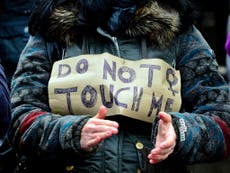Boycotting Israeli goods is about to become a criminal offence - so much for 'power to the people'
There was a time when David Cameron wanted everyone to get involved in hyper-local politics. But now he's decided he'd rather you didn't


News has emerged this week that “shunning Israeli goods” is about to become a criminal offence for public bodies and student unions in the UK. Put simply, the law will prevent publicly funded institutions - including local authorities – choosing to refuse to buy goods from companies involved in the arms trade, fossil fuels, tobacco products or illegal Israeli settlements in the West Bank.
From here-on out, these institutions will face severe penalties for attempting to implement morally driven boycotts. What people are rightfully concerned about is the way in which this will prevent everyday voters from voicing their opposition to a decades-long humanitarian crisis in the Middle East.
Why? It's complicated.
There are scholars who’ve spent their entire adult lives trying to figure out what’s going on with Israel, Palestine and the Gaza Strip. But the long and short of it is: there are a lot people arguing over one scrap of land, all of them have strong cultural and religious ties to the area and it’s nigh impossible to decide who’s right and who’s wrong.
Yet as fate would have it, only one of these groups is extremely well-funded and super-connected. That’s why Israel can do pretty much whatever the hell it wants to Gaza and the native Palestinians who live there. World superpowers ordinarily wouldn’t stand for it. Yet because Israel is a key Western ally in the region, governments like the UK tend to turn a blind eye to any and all alleged crimes against humanity that might be taking place in the region.
The citizens of the UK aren’t quite as happy to ignore it all as the government, however. That’s why local councils and public bodies across the country have recently – and historically - taken it upon themselves to bypass their national government and send Israel a message that not everyone in the UK agrees with its policies, particularly its practice of allowing settlements in Palestinian territories which are considered illegal under international law.
Leicester City, Stirling, Clackmannanshire, Midlothian and West Dunbartonshire Councils have all implemented local bans on goods that come out of Israel and its illegal settlements. More than a few student unions have followed suit.
You’d think ministers would be proud of that. Young people and everyday voters connecting with international issues, debating ethical dilemmas and implementing legislative policy on a local level in order to mirror the views of ordinary people – isn’t that what Big Society is all about? Apparently not.
If David Cameron wants local authorities and everyday people to get involved in politics, that’s great. But he needs to walk the walk. The government can’t take that voice away from people simply because it doesn’t like what’s being said.
You see, politicians love to hear what’s happening at the local level, but only if it’s about filling potholes or building houses. When activists and students start talking about their views on dynamic global issues, the government starts to get nervous.
When David Cameron rose to power in 2010, he did so based upon a platform of devolution and pluralism. Under the highly marketable banner of creating that ‘Big Society’, Westminster unleashed a wide array of initiatives designed to empower local authorities and grassroots activists, and give them a stronger voice on the global stage.
At least, that was the dream. But fast-forward six years, and the UK Government is clumsily attempting to mop up every single trace of the hyper-local activism it once encouraged. The latest casualty of this U-turn? This new ban on boycotting goods which a group might be morally against – a ban on bans, if you will.
After all, allowing open disagreements about these sort of things might inadvertently prove to the whole wide world that not everyone in Britain thinks alike. People might start to think we live in an open democracy.
And why on earth would we want them thinking that?



Join our commenting forum
Join thought-provoking conversations, follow other Independent readers and see their replies